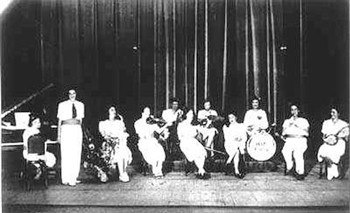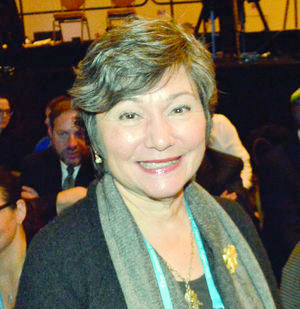by Daniel Hathaway

That orchestra was the Women’s Orchestra of Auschwitz, to be commemorated by the Cleveland Women’s Orchestra in a free concert on Sunday, December 6 at 3:00 pm in Kangesser Hall at The Park Synagogue. Robert Cronquist will conduct music by Franz Schubert, Johannes Brahms, Erich Korngold, and Frédéric Chopin in a performance narrated by WCLV president Robert Conrad. Hedy Milgrom, who is vice-president for endowments and development at the Jewish Federation of Cleveland, will share some personal reflections.
The Women’s Orchestra of Auschwitz was organized by SS women’s camp commander Maria Mandel in April of 1943, and originally led by Polish violinist Sofia Tchaikoswka, who had recruited sister prisoners to form an ensemble of fifteen players within a month. The orchestra, later led by Gustav Mahler’s niece, Alma Rosé, played for the arrival of deportées and performed at the camp gates in the mornings and evenings when work gangs went out and returned — among some more unsavory musical duties.
“The Nazis were so diabolical,” Milgrom said. “The musicians were told to play music from the countries from which the transports were arriving. My mother was coming from the Hungary-Czechoslovakia area, and undoubtedly they played music from those regions — to calm everybody, right?”
Cleveland Women’s Orchestra manager Joan Ferst and Hedy Milgrom thought of presenting a concert based around the Auschwitz orchestra fifteen or twenty years ago. “We first talked about it after the Vanessa Redgrave film Playing for Time came out,” Milgrom said. “Joan is the mover and shaker, the heart and soul behind Cleveland Women’s Orchestra — I can’t say enough about her. Joan knew that my parents were Holocaust survivors and she said, ‘Wouldn’t it be wonderful to do a concert that would memorialize the women musicians of Auschwitz?’”
That didn’t came to pass at the time, but the Violins of Hope Cleveland project gave the idea the boost it needed. “I had been working on the project for three years as the Jewish Federation’s liaison to Violins of Hope,” Milgrom said. “For me it was a professional milestone, but also huge on a personal level because of my family’s connection to the Holocaust. It’s been amazing to have the two sides of my life connect so deeply. And I play the violin!
“Joan was once again indefatigable, and said, ‘We have to make this concert work.’ She put together a proposal and got some modest funding,” Milgrom said. “Bob Cronquist has been superb as well. It was Joan’s idea that I should speak at the concert, and Bob Conrad came aboard as the narrator.”
The performance will feature music that might have been played by the Women’s Orchestra of Auschwitz, including Franz Schubert’s Symphony No. 8 in b (“Unfinished”), Johannes Brahms’s Hungarian Dance No. 1, Johann Strauss Jr.’s On the Beautiful Blue Danube, Erich Korngold’s “Marietta’s Lied” from Die Tote Stadt, and Frédéric Chopin’s In Mir klingt ein Lied.
Milgrom will give a short talk about the impact of the Holocaust — and of music — on her family. “This whole project is illustrative of the power of music. When you can use music for good, it’s transformative, it’s restorative. I saw this in my parents throughout their lives — that music could bring them to another time and place, that it could soothe the soul.”
Hedy Milgrom hasn’t seen the Vanessa Redgrave film. “I probably won’t,” she said, “but the recent book From Vienna to Auschwitz is a more accurate portrayal of Alma Rosé, who was not a monster, as the film depicts her. The fact is that every woman who played in the orchestra survived the camps except for Alma, who they think was probably poisoned. Not that the conditions were good for them, so many people died anyway.”
As things turned out, the Women’s Orchestra of Auschwitz played for little more than a year. In November of 1944, its Jewish members were taken to Bergen-Belsen, where there was no orchestra and no such special privileges as the women had received at Auschwitz. Finally, they were liberated by British troops.
Published on ClevelandClassical.com December 1, 2015.
Click here for a printable copy of this article



